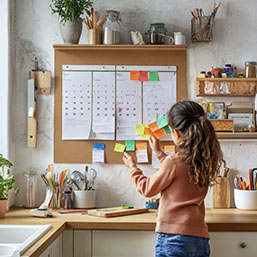
\n
No matter the number of kids in your family, it’s very easy for extracurricular activities to take over. It starts off simply enough – you say yes to a little of this and a little of that, and suddenly, you are over-committed and praying for the end of the year so that your family can get a little rest.
\n \nThe answer to the balance question will be different for every family – and, quite possibly, for each child in the family. Here are some things to consider as you make plans for the year ahead.
\nHow much is too much?
\nThis decision is first and foremost up to the parents, and it is based on a few factors:
\nYour time budget. How much of your time do you want to spend driving kids all over the planet? Even if they can walk to the activity, how much of your weekend/afternoons/evenings do you want committed to a schedule over which you have no power?
\nYour financial budget. How much money do you have to spend on each activity, the gear, the gas, and the snacks?
\nYour priorities. What is most important for your family?
\nA. Having your kids occupied or having your kids at home with free time?
\nB. Team or individual activities?
\nC. Arts or sports?
\nFor example, some families commit to one art and one sport per child per term.
\nEach child’s temperament. You know your child best. Some will thrive with being booked regularly, while others need their downtime, along with extra time for homework.
\nThe clearer you can be with the answers to the above questions, the easier it will be on everyone. Firm boundaries help kids and parents alike to understand the activity choices they have. Once your kids know what’s allowed, they can choose activities that fit the parameters. If you’ve got kids under ten, make this as concrete and visual as you can, using a calendar and color coding. When the activity spaces are full – they are full, end of discussion.
\nHow to be okay with saying “no”
\nIt’s easier to be okay with saying “no” if we understand what we are teaching. When we have outlined the criteria around extra-curricular activities, we show our kids how their involvement affects the family as a whole and enable them to make decisions within the parameters. If they want to do a different activity, they will need to give up something else – or put it on a waitlist for next semester’s plan.
\nWhile I don’t believe that parents should be saying “no” all the time, I do think it is critical to know when and where you will stick to your “no.” Kids learn about “no” from us. If it’s firm, they can stay firm. If “no” really means “keep nagging me to change my mind,” they learn that, too.
\nWhen kids experience a firm “no”:
\nA. They learn to deal with disappointment.
\nB. They learn how to give a firm “no” in their own lives. This is important with their peers in the future. If they are asked to do something that they know to be wrong, they should be able to stick to “no” despite peer-pressure.
\nWhat about peer pressure?
\n“Everyone is playing this sport! Everyone is going to this event! Why can’t I?”
\nThis is another tricky part of parenting, and one that can require a variety of responses:
\nA. We can be empathetic. “It sounds like you really want this and that many people are doing it.” This doesn’t mean we change our mind, just that we understand their feelings.
\nB. We can be clear. “In our family, we don’t participate in this activity. You can blame me for being the bad guy here, but it just doesn’t work for our family.”
\nC. We can involve them in a different solution. “In order for you to take on this activity, you will need to give up something else. What are you willing to stop doing?” Or, “In order for you to take on this activity, you will need to come up with the funds – how will you raise this money?”
\nAfter your kids have had a chance to cool off from any frustration at not being able to participate, ask them if they know what they’ll say to their friends.
\nIf they’re not sure, ask if they’d like to brainstorm it with you. Sometimes role-playing the situation can help them to feel more comfortable about the outcome overall.
\nWhen it comes to balancing the schedule, meeting each child’s needs uniquely makes more sense to me than doing exactly the same for everyone. Some kids can handle a little more, others will choose a little less. The main goals are family health and sanity.
\n\n
Author, blogger, podcast host, and parenting expert, Julie Freedman Smith has been supporting parents across North America for 20 years. Through her company JFS Parent Education, she helps parents find relief from their everyday parenting challenges. Want to know how she can help you? Email her today:
\n
See our related articles:
\n
Calgary’s Child Magazine © 2025 Calgary’s Child